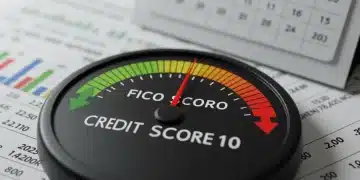Nation credit score improvement: tips to boost your score

Improving your nation credit score involves monitoring your credit report, making timely payments, keeping old accounts open, and maintaining a low credit utilization ratio to enhance your creditworthiness effectively.
Nation credit score improvement is crucial for anyone looking to enhance their financial health and secure better deals. Have you ever wondered how a few simple steps can significantly elevate your credit score? Let’s explore the methods that can lead to a brighter financial future.
Understanding credit scores and their importance
Understanding your credit score is essential for financial success. It plays a crucial role in determining your ability to secure loans, rent apartments, and even get jobs. A credit score reflects your creditworthiness based on your financial behavior.
What is a Credit Score?
A credit score is a number that represents your credit risk. The score ranges from 300 to 850, with higher scores indicating better creditworthiness. Factors influencing your score include payment history, amounts owed, length of credit history, new credit, and types of credit used. Knowing these components helps you manage your score effectively.
Why is a Good Credit Score Important?
A good credit score opens doors to numerous financial advantages. Here are some benefits:
- Lower interest rates on loans and credit cards
- Higher chances of loan approval
- Better insurance premiums
- Increased negotiating power for housing costs
Not only does a good score save you money, but it also increases your chances of getting approved for a mortgage or renting an apartment. Moreover, some employers review credit scores as part of the hiring process, making it crucial for jobseekers to maintain a healthy score.
Improving your credit score requires consistent effort. Start by reviewing your credit report for errors, paying your bills on time, and avoiding taking on too much debt. Integrating these habits into your financial routine will significantly boost your score.
Key factors for improving your nation credit score
Improving your credit score is a vital step towards better financial health. Several key factors influence your nation credit score, and understanding them can help you make informed financial decisions.
Payment History
Your payment history is the most significant factor affecting your credit score. Consistently making payments on time shows lenders that you are reliable. Even one late payment can negatively impact your score. By setting up automatic payments or reminders, you can ensure that bills are paid promptly.
Credit Utilization Ratio
This ratio compares the amount of credit you are using to your total credit limit. It’s recommended to keep this ratio below 30%. For instance, if your total credit limit is $10,000, try not to carry a balance higher than $3,000. Lowering your balances can help improve your score quickly.
Length of Credit History
The longer your credit history, the better it reflects on your score. Lenders prefer to see a long history of responsible credit use. Keeping old credit accounts open, even if you don’t use them often, can positively affect your score.
Types of Credit
Having a mix of credit types—such as revolving credit (credit cards) and installment loans (car loans or mortgages)—can benefit your score. This shows that you can manage various credit types responsibly. However, only take on credit that you need and can manage.
It’s also important to avoid unnecessary credit inquiries. Each time you apply for new credit, a hard inquiry is made, which can negatively impact your score temporarily. Instead, focus on maintaining your existing credit and making regular payments. Remember, patience and responsible habits are key to achieving significant improvements in your nation credit score.
Effective strategies to boost your score

Boosting your credit score requires a strategic approach. There are several effective methods to improve your nation credit score, and implementing these strategies can lead to better financial opportunities.
Regularly Check Your Credit Report
It’s important to monitor your credit report regularly. Checking for errors can help prevent unwanted drops in your score. You can obtain a free credit report from various sources. If you find discrepancies, dispute them to ensure your report reflects accurate information.
Pay Your Bills on Time
Your payment history is a crucial factor in your credit score. To stay on track, consider setting reminders for due dates. Automatic payments can also help you avoid late fees and missed payments, which can drastically lower your score.
Reduce Your Credit Utilization
As mentioned previously, keeping your credit utilization below 30% is essential. Here are a few strategies to achieve this:
- Pay down existing credit card balances.
- Request a credit limit increase, if possible.
- Utilize multiple credit accounts to spread out usage.
These steps can help improve your credit utilization ratio, contributing positively to your overall score.
Avoid New Hard Inquiries
When you apply for new credit, a hard inquiry can temporarily lower your score. Try to limit these inquiries by only applying for new accounts when necessary. If you plan to apply for a big purchase like a home, space out your applications over several months.
Patience is key. By consistently following these strategies and being mindful of your credit habits, you can effectively boost your nation credit score over time. Simple changes in your financial behaviors, combined with due diligence, can lead to significant improvements.
Common mistakes to avoid when improving credit
When working to improve your nation credit score, avoiding common mistakes is essential. Many individuals unknowingly hinder their progress by making errors that can negatively impact their score.
Ignoring Your Credit Report
One of the most significant mistakes is not regularly checking your credit report. By neglecting to review it, you may miss errors or fraudulent activities that can lower your score. Make it a habit to request your credit report at least once a year and check for inaccuracies.
Making Late Payments
Payment history is crucial for your credit score. Missing or making late payments can significantly hurt your score. Set up automatic payments or reminders to ensure bills are paid on time. Consistency is key to building a positive payment history.
Closing Old Accounts
Many people think closing old credit accounts improves their score, but this is often not the case. Keeping old accounts open can help improve the length of your credit history, which is beneficial for your score. Instead of closing, consider using them occasionally to maintain activity.
Taking on Too Much Debt
Another common mistake is accumulating too much debt on credit cards. Your credit utilization ratio, which compares your credit card balances to your limits, plays a significant role in your score. Aim to keep this ratio below 30% to show responsible use of credit.
Being aware of these pitfalls can help you navigate your credit journey more effectively. Whether it’s about managing payments, monitoring your credit history, or understanding your credit utilization, taking small but informed steps can lead to significant improvements in your nation credit score.
Resources for further learning about credit scores
Learning about credit scores is a continuous journey. Having access to reliable resources can help you deepen your understanding and effectively manage your nation credit score. Here are some valuable resources to consider.
Online Educational Platforms
Websites like Credit Karma and NerdWallet provide articles, tools, and calculators to help you gauge and improve your credit. These platforms are user-friendly and offer tips that are easy to follow.
Books on Personal Finance
There are many books available that cover credit scores and personal finance. Look for titles such as:
- The Total Money Makeover by Dave Ramsey
- Your Score by Anthony Davenport
- Freeing Your Finances by Chris Hogan
These books provide great insights and strategies for managing credit and improving financial health.
Credit Counseling Services
If you prefer one-on-one guidance, consider reaching out to non-profit credit counseling services. These organizations offer free sessions where you can learn about credit scores, budgets, and financial planning. They can create personalized action plans to help you improve your score effectively.
Workshops and Webinars
Look for local community centers, libraries, or financial institutions that host workshops on credit management. Many of these events are free and provide important information on credit scores and how to maintain a healthy credit profile.
Utilizing these resources can dramatically enhance your knowledge about credit scores. The more you learn, the better prepared you will be to manage your nation credit score effectively and achieve your financial goals.
FAQ – Frequently Asked Questions about Improving Your Nation Credit Score
What is a credit score?
A credit score is a number that indicates your creditworthiness based on your financial behavior, typically ranging from 300 to 850.
How can I monitor my credit report?
You can check your credit report for free from major credit bureaus like Equifax, Experian, and TransUnion at least once a year to catch any errors.
What are the key factors that affect my credit score?
Key factors include your payment history, credit utilization ratio, length of credit history, types of credit accounts, and new credit inquiries.
How can I improve my credit score quickly?
You can improve your score by paying bills on time, reducing outstanding debt, and keeping old credit accounts open to enhance your credit history.





